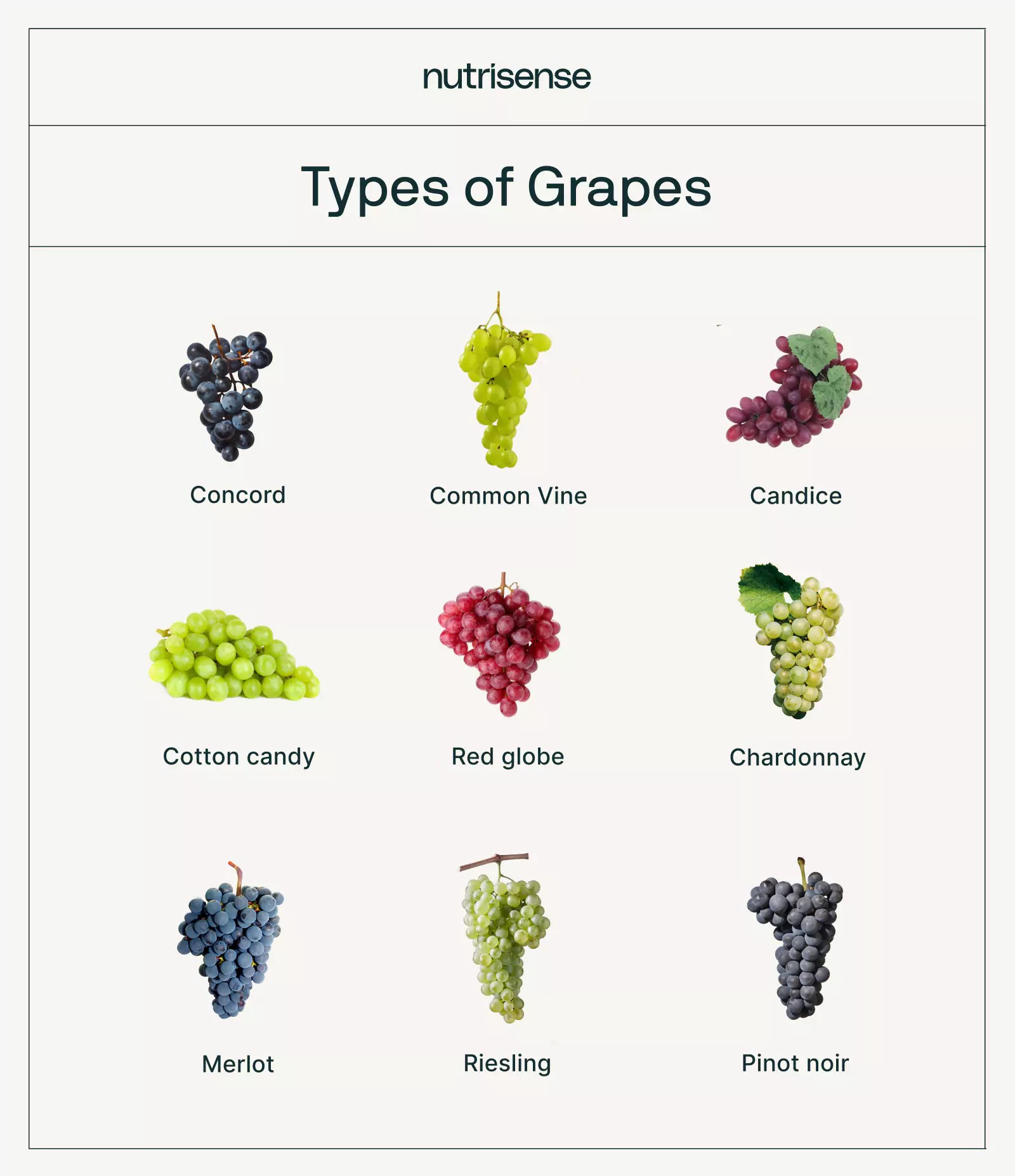Grapes, celebrated for their rich history dating back to 6500 BC, offer versatility in culinary applications, from fresh snacks to delectable wines. At HOW.EDU.VN, we understand the importance of balanced nutrition, especially when considering the sugar content in fruits like grapes. This article delves into the sugar composition of grapes and their potential impact on blood sugar levels, providing insights for everyone, including individuals managing diabetes, so keep reading to explore the glycemic index, nutritional benefits, and strategies for incorporating grapes into a balanced diet, enhancing your understanding of this popular fruit.
1. Understanding Grape Varieties
You’re likely familiar with common table grapes like green, red, black, and seedless varieties, readily available in grocery stores. However, the world of grapes extends far beyond these, with over 10,000 types cultivated globally for diverse purposes, including wine-making and jam production, and all grapes offer nutritional value, with slight variations in sweetness and acidity.
Table grapes are generally larger and less acidic than wine grapes. Wine grapes, on the other hand, are sweeter and contain more seeds and are prized for their intense flavors and suitability for fermentation. Despite these differences, all grapes are relatively low in calories, with approximately 30 calories per half-cup serving, and the nutritional content varies with the type of grape.
Here’s a glimpse at some popular grape varieties:
| Variety | Use | Characteristics |
|---|---|---|
| Concord | Juice, Jelly | Bold flavor, deep purple color |
| Common Vine | Table Grapes | Widely available, versatile |
| Candice | Table Grapes | Sweet, crisp texture |
| Cotton Candy | Table Grapes | Distinct cotton candy flavor |
| Red Globe | Table Grapes | Large, round, red berries |
| Chardonnay | Wine | Dry white wine, citrus notes |
| Merlot | Wine | Red wine, smooth, fruity |
| Riesling | Wine | Aromatic white wine, floral notes |
| Pinot Noir | Wine | Light-bodied red wine, earthy notes |




2. The Relationship Between Grapes and Blood Sugar Levels
Grapes, primarily composed of glucose and fructose, provide a readily available energy source for the body, and this sugar content might raise concerns for individuals monitoring their blood sugar levels. However, despite their sweetness, grapes have a surprisingly low glycemic index (GI), which measures how quickly a food raises blood glucose levels. This low GI suggests that grapes may not cause rapid spikes in blood sugar, making them a potentially suitable option for certain diabetes management plans.
Moreover, red grapes contain beneficial polyphenols, including resveratrol, quercetin, catechins, and anthocyanins. These compounds have demonstrated the potential to reduce hyperglycemia and high blood sugar levels, offering potential benefits for individuals with type 2 diabetes. Additionally, these polyphenols may contribute to managing kidney disease and enhancing insulin sensitivity.
Despite promising research, it’s crucial to consume grapes in moderation and consider individual responses to their sugar content. Consulting with a healthcare professional or registered dietitian can provide personalized guidance based on your specific health needs and diabetes management plan.
3. Unveiling the Health Benefits of Grapes
Grapes, as a fruit, offer a spectrum of health benefits that can be incorporated into a well-rounded diet. While all grapes provide nutritional value, red and darkly colored grapes contain higher concentrations of flavonoids and phytonutrients, enhancing their potential health-promoting properties. These compounds contribute to the antioxidant and anti-inflammatory effects associated with grape consumption.
Some of the health benefits of grapes include:
-
Antioxidant and Phytonutrient Powerhouse: Grapes, especially red varieties, are rich in antioxidants that combat oxidative stress, potentially reducing the risk of cardiovascular disease and cancer. They also possess anti-inflammatory properties, contributing to overall health and well-being.
-
Heart Health Promotion: The flavonoids and resveratrol found in grapes can help prevent heart disease by reducing the risk of high blood pressure and improving cholesterol levels. These compounds contribute to maintaining a healthy cardiovascular system.
-
Brain and Bone Health Support: Grapes provide essential micronutrients like vitamin K, magnesium, and potassium, which are crucial for maintaining healthy bones. Additionally, compounds in grapes may reduce risk factors associated with certain diseases, contributing to overall brain and bone health.
-
Potential for Lowering Insulin Resistance: While further research is needed, certain compounds in grapes may improve insulin sensitivity and reduce oxidative damage, potentially benefiting individuals with type 2 diabetes. However, individual responses to grape consumption should be carefully monitored.
-
Dietary Fiber Source: Grape peels are high in fiber, which promotes feelings of fullness, regulates blood glucose levels, and improves digestion. Fiber intake from fruits and vegetables can also help prevent heart disease, cancer, and diverticular disease.
4. Integrating Grapes into a Diabetes-Friendly Diet
Grapes can be included in a diabetes-friendly diet when consumed in moderation. Fresh fruit, including grapes, provides dietary fiber, vitamin C, vitamin A, and copper. Remember to focus on portion control, balancing grape consumption with other nutrient-rich foods, and monitoring individual blood sugar responses.
The American Diabetes Association recommends that people with diabetes consume approximately 15 grams of carbohydrates from fruit per serving, equivalent to about 17 small grapes or two tablespoons of raisins. By adhering to these guidelines, individuals with diabetes can enjoy the health benefits of grapes without significantly impacting their blood sugar levels.
5. Creative Ways to Enjoy Grapes in Your Diet
Grapes are versatile and can be incorporated into your meals in various creative ways to maximize their health benefits. Here are a few ideas to spark your culinary inspiration:
-
Add Grapes to Salads: Enhance your salads with a touch of sweetness by adding sliced grapes. Combine them with mixed greens, grilled chicken or fish, and a light vinaigrette for a balanced and flavorful meal.
-
Blend into Smoothies: Create a refreshing and nutritious smoothie by blending grapes with other fruits, vegetables, yogurt, and a source of protein like protein powder or nut butter. This makes for a quick and convenient breakfast or snack.
-
Swap Jelly for Fresh Grapes: Reduce your intake of added sugars by replacing traditional grape jelly with crushed fresh grapes in your sandwiches. Combine with peanut butter or almond butter for a satisfying and healthier alternative.
-
Include in Snack Platters: Create a balanced snack platter with grapes, cheese, nuts, and whole-grain crackers. This combination provides a mix of carbohydrates, protein, and healthy fats, helping to stabilize blood sugar levels and keep you feeling full.
-
Incorporate Grape Seed Extract: Don’t overlook the benefits of grape seed extract, derived from grape seeds. This extract is rich in antioxidants and may offer protective effects against various health conditions, including cardiovascular disease, inflammation, and diabetes.
6. Important Considerations When Eating Grapes
While grapes offer numerous health benefits, it’s important to consider a few factors when incorporating them into your diet.
Consuming excessive amounts of grapes may lead to digestive issues due to their natural sugar content. Portion control is key to avoiding these issues. Individuals may also have varying sensitivities to the natural sugars in grapes, so it’s helpful to test different amounts to determine individual tolerance.
For people with diabetes, monitoring blood sugar levels after consuming grapes is crucial to understand how they affect individual glucose responses. This information can help inform dietary choices and ensure that grape consumption aligns with overall diabetes management goals.
7. Frequently Asked Questions About Grapes and Sugar Content
To further clarify the role of grapes in a balanced diet and address common concerns, here are some frequently asked questions:
- How many grams of sugar are in a cup of grapes? A cup of grapes (about 92 grams) contains approximately 15 grams of sugar, primarily in the form of glucose and fructose.
- Do grapes have a high glycemic index (GI)? Grapes have a low to moderate glycemic index, ranging from 43 to 53, depending on the variety. This means they have a relatively slow impact on blood sugar levels compared to high-GI foods.
- Are grapes safe for people with diabetes? Grapes can be safe for people with diabetes when consumed in moderation as part of a balanced diet. Monitoring blood sugar levels and practicing portion control is essential.
- What are the benefits of eating grapes? Grapes are rich in antioxidants, phytonutrients, and fiber, offering numerous health benefits, including heart health support, improved brain function, and reduced risk of chronic diseases.
- Can grapes cause weight gain? Grapes, like any food, can contribute to weight gain if consumed in excess. Practicing portion control and balancing grape consumption with other nutrient-rich foods is crucial for maintaining a healthy weight.
- Are red grapes healthier than green grapes? Red grapes generally contain higher levels of antioxidants and phytonutrients compared to green grapes, making them slightly more beneficial for overall health.
- How can I incorporate grapes into a healthy diet? Grapes can be added to salads, smoothies, snack platters, or enjoyed as a standalone snack. They can also be used as a natural sweetener in recipes, replacing added sugars.
- What is grape seed extract, and what are its benefits? Grape seed extract is derived from grape seeds and is rich in antioxidants, offering potential benefits for cardiovascular health, inflammation reduction, and overall well-being.
- Are there any risks associated with eating grapes? Consuming excessive amounts of grapes may lead to digestive issues due to their natural sugar content. Individuals with fructose malabsorption should also exercise caution when eating grapes.
- Where can I find expert advice on managing my diet with grapes? For personalized dietary guidance and support, consult with a registered dietitian or healthcare professional. Additionally, resources like HOW.EDU.VN offer valuable information and insights on balanced nutrition.
8. Conclusion: Embrace the Sweetness of Grapes Responsibly
Grapes, with their rich history and diverse varieties, offer a delightful and nutritious addition to a balanced diet. While their sugar content warrants consideration, the health benefits they provide, including antioxidants, phytonutrients, and fiber, make them a worthy inclusion. By understanding the glycemic index, practicing portion control, and monitoring individual responses, you can confidently enjoy the sweetness of grapes while supporting your overall health and well-being.
At HOW.EDU.VN, we connect you with leading experts who can provide tailored advice to navigate your dietary choices.
9. Connect with Experts at HOW.EDU.VN for Personalized Guidance
Are you seeking personalized guidance on incorporating grapes into your diet or managing specific health concerns? At HOW.EDU.VN, we connect you with a network of over 100 distinguished Ph.D.s and experts across various fields who can provide tailored advice and support.
We understand the challenges individuals face in finding qualified experts and the importance of reliable, personalized information. Our platform offers a seamless way to connect directly with experts, ensuring you receive the most relevant and trustworthy guidance for your unique needs.
Our services include:
- Direct Access to Experts: Connect with experienced Ph.D.s and professionals who can address your specific questions and concerns.
- Personalized Consultation: Receive customized advice tailored to your individual health goals and dietary preferences.
- Cost-Effective Solutions: Save time and money by accessing high-quality consultations at competitive rates.
- Confidential and Reliable Advice: Ensure the privacy and security of your information while receiving trusted guidance.
Ready to take control of your health and well-being?
Contact us today to schedule a consultation with one of our leading experts:
- Address: 456 Expertise Plaza, Consult City, CA 90210, United States
- WhatsApp: +1 (310) 555-1212
- Website: HOW.EDU.VN
Let how.edu.vn empower you with the knowledge and support you need to make informed decisions and achieve your health goals.
